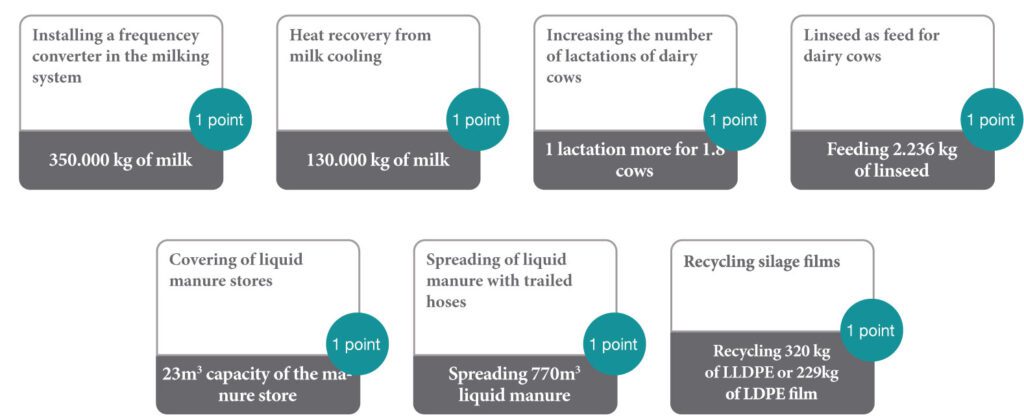Share this page
Alignment with SDGs
AUTHOR
Maria Bystricky Agroscope, Zurich • Switzerland
Abstract
As one of the most important agricultural producer and distributor organizations in Switzerland, IP-SUISSE launched a new program with the goal to reduce greenhouse gas emissions from its farms by 10%. All farmers producing under the IP-SUISSE label must achieve a certain number of climate points, which they do by implementing climate protection measures.
Agroscope, the Swiss center of excellence for agricultural research, developed the point system together with IP-SUISSE. Using life cycle assessment methodology, we calculated the emission saving potential of each climate protection measure on model farms. From that, we derived the theoretical greenhouse gas savings of each measure and the extent to which each measure must be implemented to achieve one climate point. The prerequisite was that measures should not impede production and should be applicable on the farms as they are.
The potential to reduce greenhouse gas emissions of model farms with most of these measures was rather small and mostly less than 1%; only covering the manure store and increasing the number of lactations led to greenhouse gas savings of 3-3.6%. However, we expect that many small measures with low reduction potential will add up if used widely on farms. In 2021, we will collect data on the climate protection measures implemented on all IP-SUISSE farms for the first time. Their evaluation will show whether the point system needs to be adjusted in order to achieve the desired result. From 2022 onwards, the point system will be compulsory for all label farms.
Swiss farmers’ organization launches new climate protection program
Agriculture causes around 10% of Switzerland’s greenhouse gas emissions. As one of the most important agricultural producer and distributor organizations in Switzerland, IP-SUISSE provides a label that aims to ensure sustainable production. Among other things, participating farmers use fewer pesticides and implement measures to promote biodiversity and animal welfare. More than 50% of the drinking milk sold in Switzerland is produced under this label. In 2021, IP-SUISSE launched a new program with the goal to reduce greenhouse gas emissions from its farms by 10%. All farmers producing under the IP-SUISSE label must achieve a certain number of climate points, which is determined individually depending on their agricultural area and number of animals.
They select climate protection measures from a list and can thus achieve savings where they can be implemented most efficiently. Agroscope, the Swiss center of excellence for agricultural research, developed the point system together with IP-SUISSE and provided data on the greenhouse gas saving potential of the individual measures. In this, we were supported by the Swiss Federal Office for Agriculture and the Swiss Milk Fiduciary (TSM Treuhand GmbH).
Modelling the potential of measures to save greenhouse gases using Life Cycle Assessment
We simulated each climate protection measure on four modelled farms that represent the average production in Switzerland (one of them was a dairy farm). Using life cycle assessment methodology, we calculated the emissions of each model farm assuming that it implemented the measure to the maximum extent, and compared them to the farm’s emissions without the measure. From the results, we derived the theoretical greenhouse gas savings of each measure and the extent to which each measure must be implemented to achieve one climate point. In addition, further environmental impacts were calculated in order to show trade-offs.
Measures with specific relevance to dairy cow husbandry include
- measures to reduce the use of fossil energy resources: installing a frequency converter for the milking system, heat recovery from milk cooling, and recycling silage films
- increasing the number of lactations of dairy cows to reduce greenhouse gas emissions from cattle rearing
- linseed as feed to reduce enteric methane emissions
- measures to reduce emissions from manure management: covering of liquid manure stores, and spreading of liquid manure with trailed hoses.
The prerequisite for defining measures was that they should not impede production and should be applicable on the farms as they are.
IP-SUISSE aims to ensure sustainable production, and more than 50% of the drinking milk sold in Switzerland is produced under this label.
Maria Bystricky Tweet
Many measures have a small but positive effect
The potential to reduce greenhouse gases with most of these measures was rather small: The dairy model farm could reduce its climate impact mostly by less than 1%; only covering the manure store and increasing the number of lactations led to greenhouse gas savings of 3-3.6%. Some of the measures had negative effects on other environmental impacts, for example cultivating linseed for use as feed increased water use and aquatic eutrophication. Energy and resource saving measures reduced greenhouse gas emissions only slightly, but had comparatively low uncertainty and almost no trade-offs in other environmental impacts. The figure below shows how much of a measure has to be implemented on a farm to get one climate point.
Overall, we expect that many small measures with low reduction potential will nevertheless add up if used widely on farms. In 2021, we will collect data on the climate protection measures implemented on all IP-SUISSE farms for the first time. Their evaluation will show whether IP-SUISSE can come close to its ambitious goal, or whether the point system needs to be adjusted or further measures need to be added in order to achieve the desired result. From 2022 onwards, the point system will be compulsory for all label farms.

References
Alig M., Prechsl U., Schwitter K., Waldvogel T., Wolff V., Wunderlich A., Zorn A. & Gaillard G., 2015. Ökologische und ökonomische Bewertung von Klimaschutzmassnahmen zur Umsetzung auf landwirtschaftlichen Betrieben in der Schweiz. Agroscope Science Nr. 29, Agroscope, Zurich, 1-160.
Furrer C., Stüssi M. & Bystricky M., 2021. Umweltbewertung ausgewählter Klimaschutzmassnahmen auf Landwirtschaftsbetrieben. Agroscope Science Nr. 121, Agroscope, Zurich, 1-160.






